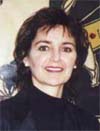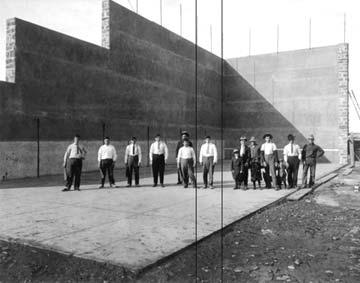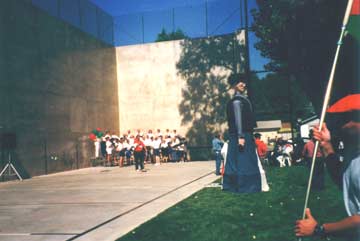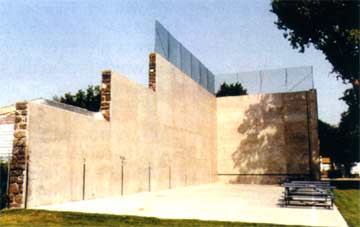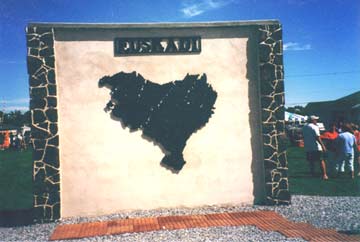

| "Fronton Festa": The Renovation of the Mountain Home, Idaho Anchustegui Fronton | ||||||||
| Gloria Totoricagüena Egurrola | ||||||||
|
The original Mountain Home Basque Association was formed in the spring of 1960 after a group of volunteers had organized the community's first Annual Basque Fiesta, which was a winter Sheepherders' Ball dance. The American Legion Hall was the site of the January 30, 1960 dance that raised money for Mountain Home charities. Founding members included Victor Lasuen, Ralph Yrazabal, Joe Aguirre, John Bideganeta, Leandro Totoricagüena, Bert Arostegui, Tacolo Chacartegui, John Barrutia, and Felipe Aguirre. These men and their wives organized the first annual summer picnic, which was to be celebrated each year at the beginning of August in the city's park. At the 1960 festival over three-hundred people enjoyed a free lamb dinner, which was donated by the Basque sheep companies in the area including Bob and Walt Bennett and Domingo Aguirre, of Aguirre & Sons sheep company.
In 1961, the Mountain Home area Basques created an organizational structure for their association and elected officers, chairpersons for events, and committees of volunteers to help implement their plans. Later, they officially incorporated with the State of Idaho for fraternal, educational, religious and charitable purposes in 1967. Membership included Basque families from Mountain Home (approximately sixty miles south of Boise), as well as those from the surrounding Snake River area; Bruneau, Grand View, Boise, Hammett, Glenns Ferry, Gooding, Shoshone, Hailey, Sun Valley and Twin Falls. The annual Mountain Home Sheepherders' Ball held in January was the main fundraiser for the Basque Association. Each year, the "Jimmy Jausoro and His Orchestra" band would travel from Boise to provide traditional Basque music along with more contemporary dance tunes from the band's repertoire. The sheepherders from all around the southern regions of Idaho and northern Nevada would be down in the valley and "home" from the ranges of sheep grazing and longed for the company of their Basque friends and especially women. The Mountain Home Basque Dancers would perform for the crowds, as would the Oinkari Basque Dancers from Boise. Though the dance was open to the general public, the majority of people were of Basque descent, and Euskera was the language most spoken. This changed in later years with the second generation of Basques inviting their non-Basque friends as well as boyfriends and girlfriends, and Euskera was heard more in the conversations of the parent and grandparent generations only. Club members sold raffle tickets and chances to win a money pot, in addition to the potent lamb auction, which raised thousands of dollars each year for Mountain Home community charities. Businesses would send representatives to the dance and would bid on a lamb until they "won" the lamb auction, usually with a bid of several hundred dollars. Then, they would announce they were returning or "donating", the lamb back to the Mountain Home Basque Association. The lamb would be up for bid again with a new winner, and this was repeated until all of the bidders had "won" and then donated the amount of dollars they had bid to the Basque association. Money raised was usually given to individuals in need of medical services such as organ transplants, wheelchairs, and special surgeries. The annual Mountain Home Basque Picnic drew together Basque families from miles away, and an all day affair of barbecued lamb and home cooking initiated a day of friendship and celebration of Basque culture. Between 1960 and 1974, volunteer committees prepared a barbecue picnic lunch for the hundreds of visitors with the lamb donated from local area Basques. The afternoon's activities included sporting competitions such as weightlifting, weight carrying, and wood chopping for adults. The children entertained themselves with running and hopping races, and an egg toss where the partners had to throw an egg to each other and catch it with their bare hands without it breaking. After each round of throwing, the lines moved farther away from each other and tried again until just one team was left with an egg intact. Most people also remember a huge tank of free lemonade that was refilled several times during the day to quench the thirst of those braving the usual 100 degree Fahrenheit temperature. The clean-up of the park before an outdoor night dance with Jimmy Jausoro was easy. The Mountain Home Basque Association would give children empty paper grocery bags, and then give them twenty five cents to return them filled with trash from the family tables and any cans left on the park grass. The children were happy to earn the money, and the organizers were relieved to not have to clean-up. The Mountain Home Basque Dancers and the Oinkari Basque Dancers- from Boise- performed traditional Basque folk dances late in the afternoon and after dinner all enjoyed a nighttime dance in the grass of the park. The Mountain Home Basque Association continued through to the late 1980s, but lack of interest from local Basques and lack of willingness to volunteer for events led to the collapse of the association from neglect. No events were held from 1988 to 1995. In 1996, several Basques determined to rejuvenate the Basque ethnic identity established the Euskal Lagunak: Elmore County Basque Association. The founding board members were John F. Bideganeta, John Lasuen, David E. Knox and Richard Urquidi, who have strengthened the membership to include over one-hundred members. This organization holds an annual membership meeting and dinner in January, a spring dance, a picnic in August, and interestingly a "Basque luau" in May. The new association joined the North American Basque Organizations (NABO) federation of Basque groups in 1997 with the hopes of bringing new ideas and help from other Basque clubs. They also spearheaded the renovation of the Anchustegui Fronton as their first major project.
José and Debbie Ibaibarriaga were selected as Fronton Restoration Chairpersons and Claude Bermensolo directed the collection bids for samples and costs of restoration materials and labor needed to restore the fronton to its original condition. It is hoped that with a "new" fronton, younger Basques will learn to play pelota, handball, and pala, similar to paddleball, and retain their interest in Basque culture. The fronton was in serious disrepair for years but stood next to the Basque Hotel, until the Hotel burned in 1983. The grounds of the former hotel were then converted to a small park across the street from the fronton. The Euskal Lagunak was able to acquire an Idaho Historical Trust Fund matching grant of $5000, if the club could raise its own $5000 first. They decided to build a flat wall monument in the park which would have an ironwork map of the seven Basque provinces on one side, and the other would have an ikurriña, or Basque flag, made of individual red, green, and white tiles. The tiles would be sold to families, individuals, and businesses who paid $50 to have their name engraved into the tile. Many people purchased tiles and put the names of deceased loved ones, others inscribed the names of their children. The estimated costs for the complete restoration summed to $30,000 and the remaining funds were raised by selling t-shirts, sponsoring a wine tasting event, and by hosting various dinners.
The Fronton Festa was held August 25, 2001 in conjunction with the North American Basque Organizations Annual Convention. NABO Delegates from Basque organizations from around the United States participated in celebrating the inauguration of the renovated handball court. The Basque priest Father Martxel Tillous traveled from San Francisco to give a Catholic mass and blessing to the structure, and speakers included Idaho Secretary of State Pete Cenarrusa, NABO President Pierre Etcharren, Mountain Home City Councilman Tom Rist, and Idaho Heritage Trust spokesperson Suzanne Schaefer. Dr. John Bideganeta served as the Master of Ceremonies. The celebration included handball matches with teams from Boise (Idaho), Elko (Nevada), and San Francisco (California) and the hope is that the near future will include a team from Mountain Home. Basque dancing groups from Boise, Ontario (Oregon), Elko, and Salt Lake City (Utah) entertained the afternoon crowd of approximately three hundred people. The Biotzetik Basque Choir from Boise also sang and performed to commemorate the fronton's opening. The night finished with the Jean Flesher Band, from Salt Lake City, playing traditional and contemporary Basque music for the assembly of Basques and friends. The highlights of the day were of course the handball games, and a very special bertso written and sung by Johnny Curutchet of San Francisco:
The twenty fifth of August Gathered in the town of Mountain Home At the handball court built by our fathers. At the beginning of the nineteenth century How many young people went across the ocean? Leaving their parents and siblings at home Traveling to America with a heavy heart. Going far away from their beloved towns Since in life one cannot have what he wishes What task would these young people face While saying "until we meet again" to Euskadi and "hello" to America? After saying hello to America Likewise to the language and the new lifestyle And having left behind their beloved Euskadi They nevertheless brought with them their game of handball. themselves so far away from where they were born They had now spent many dark days. A number of them gathered together and decided That only with a handball court could they truly be Basque. They concluded a "kancha" had to be built And started to work with great pleasure. How tiresome it was, who would ever know For Pedro and Josefa and their friends? You always gathered many friends together Because in you they could find what they were missing. Unfortunately a fire burned down the hotel next to you And you were left sad, the same as a widow. Playing handball so many times since childhood Against a fine wall with old stones Remembering how difficult it must have been to construct We felt indebted to preserve you. You are made up like a flower arrangement We were so concerned about your future Fame and wealth get lost with time But you will exist as long as there is life on Earth. Our forefathers left this world to go to the next We feel your presence watch over us Send grace from heaven That we will be saved, as well as Euskera. Dr. Gloria Totoricagüena Egurrola, Center for Basque Studies, University of Nevada, Reno |
Euskonews & Media 202. zbk (2003 / 03 / 07-14)
Dohaneko harpidetza | Suscripción gratuita | Abonnement gratuit |
Free subscription
Aurreko aleak | Números anteriores | Numéros précedents |
Previous issues
Kredituak | Créditos | Crédits | Credits
Euskomedia: Euskal Kultur Informazio Zerbitzua
Eusko Ikaskuntzaren Web Orria
webmaster@euskonews.com
| QUIENES SOMOS | Política de privacidad | Avisos Legales | Copyright © 1998 Eusko Ikaskuntza |
